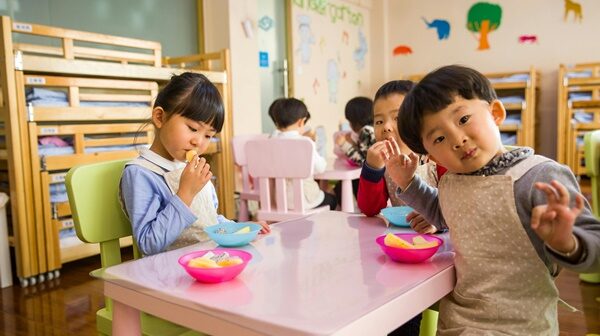The education that your child receives at an early age is crucial to their overall formation as older students and, eventually, adults. Although most parents prioritise an education that gives their kids a good head start in terms of academics, learning experiences that are only focused on the academic side may deprive your child of key life skills and insights that would serve them well in the future.
To that end, great care should be taken when it comes to choosing which preschool to enrol your child in. It would be good for you to explore centres that promise a holistic education for your child, which is a learning approach that emphasises looking at the bigger picture. That means tackling the mental, emotional, physical, and spiritual needs of the learner as opposed to just focusing on academics, as is typical for many schools. Here are five aspects of a holistic educational approach that will set the ideal preschool apart from others:
1) The Curriculum is Child-Centred
Holistic education is, at its core, child-centred. The approach of the educators should closely consider and be anchored on a child’s individual needs, instead of assuming that blanket pedagogies work for every child.
What are your child’s interests at their age and development stage? What do they find enjoyable? How do they interact with their surroundings? The answers to these questions should factor into how your child will be taught, thus making the learning process much more individualised rather than a one-size-fits-all approach.
Little learners should be empowered, their voices should be heard out, and they should be encouraged at all times to freely express themselves. These are vital aspects of any preschool that proffers a holistic approach in their methods. For one such preschool in Singapore, consider enrolling in Kinderland, as Kinderland education puts a special emphasis on holistic learning through music, sports, and health education, and extracurricular activities. Find out what parents say about Kinderland to learn more about the school’s approach.
2) Environment and Community Are Key Aspects of the School’s Educational Approach
It’s important to note that holistic education doesn’t occur in a vacuum. As the term suggests, it requires interconnection as a means of learning. The environment and community surrounding your child are very important aspects of their holistic learning journey, and your chosen preschool should boast both a conducive environment for learning and a strong sense of community among students, teachers, administrators, and parents.
An environment where children can safely play and express themselves is paramount in your choice of preschool. This can entail, among other things, having a play area that’s outfitted with rubber mat flooring for safety, toys that don’t have choking hazards or pointed pieces in them, and a space free from other dangerous equipment or substances that kids can explore freely.
Likewise, having a supportive community around them in the form of teachers and classmates will help bring out preschoolers’ best selves and teach them how to socialise. Don’t be remiss in finding a preschool environment that’s warm, open, and pleasant for your child to integrate themselves into every day.
3) Learning Experiences Go Beyond Textbook Approaches
Learning in itself won’t happen effectively if the child receiving the instruction isn’t engaged with the material being taught. This is all the more important in the holistic approach to learning, wherein the focus should be on the child bringing out their own unique potential. A school that is truly holistic in their pedagogies will go beyond simply having kids follow rote instructions or memorise facts.
Today’s holistic learning experiences are characterised by activities like the following:
- Play-and-learn sessions
- Arts and crafts to develop preschoolers’ creativity and focus
- Teaching kids how to play instruments to tap into their sense of rhythm
- Reading storybooks to cultivate a love for reading
Later in life, these young pupils will have their fair share of lectures and tests. At this stage in their lives, however, where a holistic education would leave its mark, their learning potential is great when it’s the natural byproduct of them having fun.
4) Holistic Education Emphasises Building Empathy among Children
Children by nature can be temperamental, which can sometimes lead to arguments or tantrums. Within a holistic educational framework, these aren’t things to be feared. Children will be taught, among other things, the importance of considering the feelings of others aside from their own.
As mentioned earlier, community is a key aspect in a child’s holistic education. Upon interacting with peers, teachers, and their own parents or guardians in a community that teaches and practises empathy, the child can get a better understanding of a world that exists beyond their own.
As they play, they’ll learn that sharing toys may be necessary. And as they openly interact with their teachers, they’ll get more chances to practise politeness and respect. Empathy can also be taught through storytelling and role-playing in class, as well as field trips or civic activities that can immerse preschoolers in the worlds of others in a hands-on manner.
5) Parents and Guardians Play a Key role in Holistic Education
Your child’s learning experience does not end in class. Holistic education should be reinforced even at home. The onus is on you to supervise a home environment where your child’s voice is always heard and where they feel that their opinions and concerns matter.
Moreover, as a parent or guardian, you should always be in touch with your child’s teachers. Holistic learning can be sustained at home if you can stay updated on your child’s learning progress and know how you can support them in ways that complement what’s being taught to them in preschool.
Given the exhaustiveness and complexity of a holistic education, it does require dedication and effort from teachers and parents alike to be implemented to its fullest. However, the benefits are truly worth it, as children will be on a path to become well-rounded members of society at an early age.
Whether your child is already enrolled in a program or you’re still looking for a school for them, keep in mind the points above so that you can help guide their holistic learning journey all year round.




